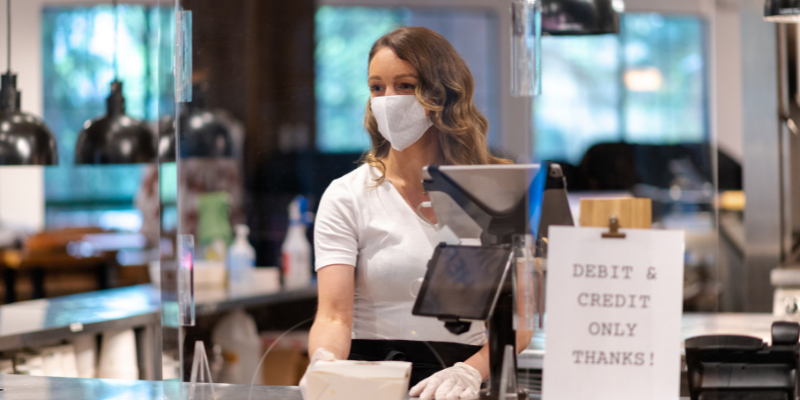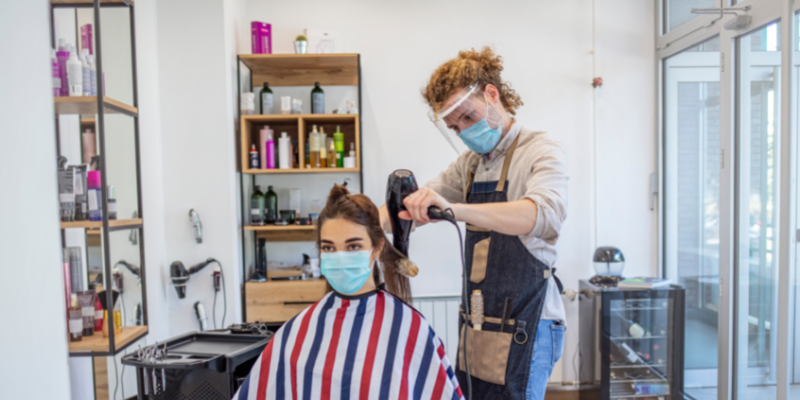The Small Business Guide to Vaccine Requirements
Can you legally require your employees to be vaccinated? We answer these questions, and more, for small business owners.

When founding a company, business owners have a demanding to-do list. Apply for a trademark, hire an accountant, build a website. Low on that list is having a plan for a pandemic.
As nationwide COVID-19 vaccination nears the halfway point, business owners have another curveball to consider: the right to require vaccination. With no modern precedent to reference, the issue leaves many small business owners in a canoe without a paddle.
Small business owners have two audiences to manage when it comes to requiring immunization—employees and customers—and each comes with its own set of rules and regulations. So we’re breaking down the legal aspects for vaccination requirements for each, as well as non-legal considerations to keep your business afloat.
Don’t forget to drop your email to get articles, videos, and insider tips on small business topics like these delivered to your inbox bi-weekly!
Vaccine Requirements for Employees

Can you legally require employees to get vaccinated? The short answer is yes, with some exceptions.
The U.S. Equal Employment Opportunity Commission (EEOC) gives the best outline of what does and does not constitute an exception for COVID-19 vaccination, but it is typically reserved for medical and religious reasons.
The implications of requiring a vaccine aren’t nearly as simple. As COVID-19 became politicized, so too has the vaccine. Small business owners need to keep their staff and customers healthy, but there are ways to tread lightly and create a culture of trust and transparency in doing so.
Have Open Conversations
Employers are legally allowed to ask if an employee has been vaccinated and for proof of said vaccination.
Take the time to have conversations with employees to discuss your vaccine expectations and gauge their willingness to get the vaccine. This will give you a good idea of how much you need to amend your business practices or provide accommodations for employees who are unwilling or unable to be vaccinated due to valid medical or religious reasons.
Preparing employees for the expectation and following through on an immunization plan reduces surprises and the pressure on small business owners to enforce vaccinations in a way that seems controlling or without boundaries.
While employers are legally allowed to require a vaccine (except where an employee has a valid medical/religious waiver), small business owners are wise to have legal counsel if a large portion of their employees are refusing vaccination.
Keep Remote Work On the Table

Vaccines aside, the risk for many workers is still present enough for the need to commit to remote work. And as second waves of the COVID-19 virus hit other countries, keeping hybrid and remote work models in easy reach is a prudent strategy through the rest of the year.
This not only prepares you for the eventuality of closing or reducing operations again but gives employees more flexibility in returning to in-person work.
Incentivize Vaccinations
Employers are on the hook for requiring vaccines and should give employees the proper paid time-off and accommodations for vaccinations. A good starting point is giving all employees two consecutive days off for the day of the vaccine and the day after the vaccine—when side effects are typically at their worst.
Work with employees to stagger vaccination schedules to ensure coverage. Other common incentives from small businesses include care packages, gift cards, a raffle, or vacation days.
Don’t Toss the Clorox Wipes Yet
Risk remains low for vaccinated parties, but employers will still be liable should an outbreak occur within the workplace.
Encourage employees to keep up stringent cleaning and disinfecting procedures. Not only do these protect you from potential regulatory and legal incidents, but it’s good practice to prepare for future waves of the virus.
Prepare to Make Tough Calls
Employees can refuse the vaccine for valid medical/religious reasons, but many people are not getting vaccinated for personal reasons. This puts small business owners in a tricky position to enforce vaccines among all employees or suspend or terminate those who are not willing to comply.
Small business owners should plan for exit strategies, onboarding, and training, and potential legal fights should a terminated employee seek legal action. While some law bodies report an employer’s right to enforce vaccination, many lawsuits are pending.
Vaccine Requirements for Customers

Can small businesses require customers to be vaccinated for service? The short answer: it depends!
Check your state requirements for employers’ rights to require vaccines (except for medical/religious reasons) from customers. However, federal law allows employers to ask for proof of vaccination from customers.
But while small business owners may retain the right to ask for proof, pushback from customers will likely deter many business owners from enforcing it. To ensure the health of your customers and employees without ruffling any feathers, read on.
Keep Up with State Guidelines
To get a handle on what’s required versus what’s recommended, check state requirements and federal CDC recommendations regularly.
Ultimately, you decide whether you want to take additional precautions of checking proof of vaccination or mask mandates even if CDC guidelines loosen on those fronts.
Know Your Industry

Now is the time to reach out to your fellow salon owners, landscapers, cleaning crews, and other leaders in your industry to get an idea of what the collective norm is, especially in your local area.
They may be your competitors, but it’s best to approach new guidelines as a united front. While state and federal guidelines for vaccines and masks continue to change, keep in mind the risk associated with your industry. For instance, beauty and spa owners may need stricter safety precautions for longer due to the nature of the business.
Consider Your Customers
The varying opinions about COVID-19 have made it difficult for business owners to satisfy every customer. As guidelines loosen, business owners should reflect on the past year and examine the customers’ response to health and safety guidelines.
- Have your customers been mask compliant throughout the pandemic?
- Have you frequently encountered customers who pushed back on wearing a mask or social distancing?
- Have your customers raised issues with non-masked employees?
- Are you living in an area where positivity rates are higher or lower than average?
All these questions will give you the insight you need to determine how you’ll implement future restrictions.
Communicate Your Policies
When you’ve reached a decision on what you will and will not implement, give your employees the adequate tools to enforce it.
Invest in de-escalation training, ensure signs are posted throughout your business, and let customers know what your guidelines are in an email, text, or social media post. Remove room for confusion and reduce the need for awkward or tense confrontations.
For small business owners who opt to require proof of vaccination, keep in mind that there is no current standard to determine a valid vaccine card. Dupes are already being bought and sold, and it’s unreasonable to expect yourself and your employees to spot a fake
For more resources on running your small business during COVID-19, click here.
To simplify the process of communicating updates and policy changes to your customers, give GoSite a try!
%20(1)%20(1).png?width=340&name=Group%2012%20(2)%20(1)%20(1).png)



